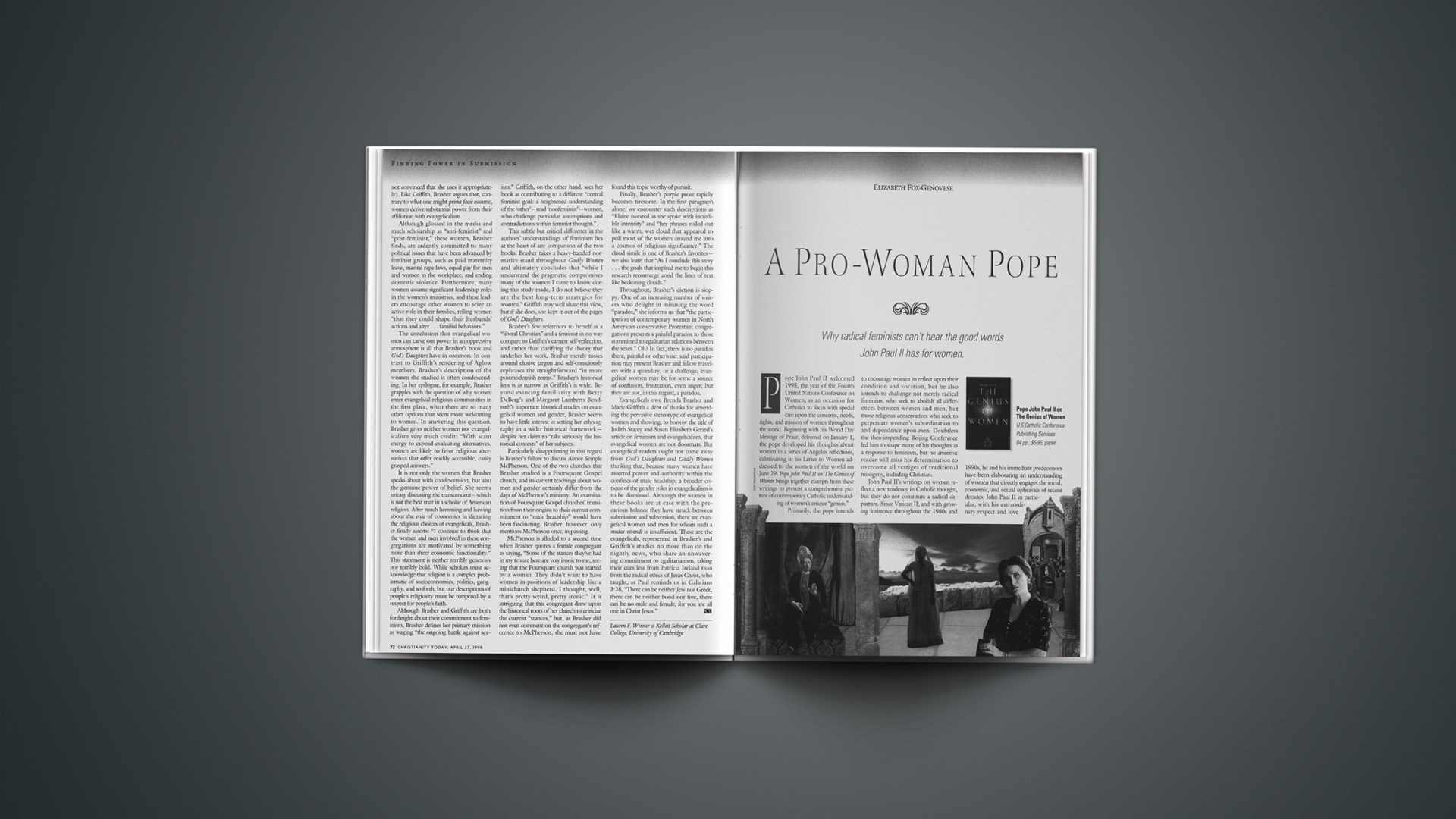Pope John Paul II on The Genius of WomenU.S.Catholic Conference Publishing Services 84 pp.; $5.95, paper
Pope John Paul II welcomed 1995, the year of the Fourth United Nations Conference on Women, as an occasion for Catholics to focus with special care upon the concerns, needs, rights, and mission of women throughout the world. Beginning with his World Day Message of Peace, delivered on January 1, the pope developed his thoughts about women in a series of Angelus reflections, culminating in his Letter to Women addressed to the women of the world on June 29. Pope John Paul II on The Genius of Women brings together excerpts from these writings to present a comprehensive picture of contemporary Catholic understanding of women’s unique “genius.”
Primarily, the pope intends to encourage women to reflect upon their condition and vocation, but he also intends to challenge not merely radical feminists, who seek to abolish all differences between women and men, but those religious conservatives who seek to perpetuate women’s subordination to and dependence upon men. Doubtless the then-impending Beijing Conference led him to shape many of his thoughts as a response to feminism, but no attentive reader will miss his determination to overcome all vestiges of traditional misogyny, including Christian.
John Paul II’s writings on women reflect a new tendency in Catholic thought, but they do not constitute a radical departure. Since Vatican II, and with growing insistence throughout the 1980s and 1990s, he and his immediate predecessors have been elaborating an understanding of women that directly engages the social, economic, and sexual upheavals of recent decades. John Paul II in particular, with his extraordinary respect and love for the dignity of each person, has regularly returned to the compelling importance of women’s vocation for the health and peace of specific societies and the world. Even the skeptical will find it difficult to read these pages without acknowledging, however grudgingly, that their author has a deep respect for and sense of pastoral responsibility to women whom the world too often demeans and abuses.
Radical feminists, however, intransigently refuse even to concede the pope’s good intentions. They regularly dismiss him with anger and contempt, protesting everything from his opposition to abortion to his devotion to the Virgin Mary. Other women and men, including many Christians, too readily assume that the Catholic church’s opposition to abortion and defense of the male priesthood necessarily brand it as fundamentally hostile to women.
John Paul II’s words do not invite this hostility. In his welcome to Gertrude Mongella, secretary general of the Beijing Conference, he claims that there can be no “honest and permanent” solutions to the issues and problems that affect women if they are not “based on the recognition of the inherent, inalienable dignity of women, and the importance of women’s presence and participation in all aspects of social life.” Indeed, recognition “of the dignity of every human being,” he insists, “is the foundation and support of the concept of universal human rights.”
In calling for women’s equal opportunities in the world of work, the pope specifically underscores the imperative of combating all forms of discrimination against women, writing, “As far as personal rights are concerned, there is an urgent need to achieve real equality in every area: equal pay for equal work, protection for working mothers, fairness in career advancements, equality of spouses with regard to family rights and the recognition of everything that is part of the rights and duties of citizens in a democratic state.” And, with respect to political life and leadership, including “the highest levels of representation, national and international,” he holds that “women are showing that they can make as skilled a contribution as men.”
Throughout these writings, the pope returns to the special “genius” of women for peace, which the world needs today more than ever. Yet authentic peace can never flourish unless “the dignity of the human person is promoted at every level of society and every individual is given the chance to live in accordance with this dignity.” Even today, in many parts of the world, women are denied acknowledgment of and respect and appreciation for “their own special dignity,” and, in the measure that they are, society suffers. John Paul II deplores the “abominable custom” that persists in some places of “discriminating, from the earliest years, between boys and girls,” and he insists that the tendency to demean girls or regard them as inferior will inevitably compromise their healthy development. As adults, women “have a full right to become actively involved in all areas of public life, and this right must be affirmed and guaranteed, also, where necessary, through appropriate legislation.”
John Paul II views respect for “the full equality of man and woman in every walk of life” as “one of civilization’s great achievements.” But he attributes the inherent equality of man and woman to God’s divine plan, asserted from the beginning of the biblical narrative of Creation. Equally with man, woman bears the imprint of the image of God. Before the Fall, man acknowledged the equality of woman, whom he welcomed with wonder and joy as “bone of my bones and flesh of my flesh” (Gen. 2:23). Sin, however, disrupted God’s plan for the full and equal communion between the equally independent beings of woman and man. The essential complementarity of the sexes persisted after the Fall, but its fulfillment has suffered innumerable setbacks, frequently manifest in the denigration of women or the willful crippling of their talents.
Some, like myself, see this simultaneous affirmation of woman and man’s complementarity and their equality as a compelling expression of the complex reality of contemporary women’s lives and sense of self. Women today appropriately insist upon their equality to men in most realms, and they passionately defend their right to develop and exercise their talents to the full—in the world as well as in the family. Many also retain a sense of specific ways in which they differ from men. The significance of those differences may have vastly diminished, but the core remains, notably in their most intimate relations with others. The pope’s reflections upon women—their vocations, their rights, their needs—thus intervene directly in the contemporary debates about women, feminism, and the postmodern world.
The essential complementarity of the sexes sexes persisted after the Fall, but its fulfillment has suffered innumerable setbacks.
These statements and others like them do not obviously label the pope as an enemy of women’s interests, and some women may well understand them as “feminist” in the sense of advocacy for women. Yet radical feminists, with Catholic feminists in the lead, take them as incontrovertible proof of the pope’s determination to condemn women to the subordination from which feminists are trying to rescue them. According to these critics, the pope betrays his true intentions by his frequent evocation of women’s special vocation as wives and mothers and by his reverence for the Virgin Mary. Such models of womanhood, they angrily charge, unmistakably concede that women may never hope to equal men and do not deserve support for their attempts to do so. As a rule, feminists, including those who sometimes insist upon the ways in which women differ from men, remain fiercely attached to the secular ideal of radical individualism: Women, like men, should be free for the unencumbered pursuit of any pleasure, occupation, or worldly success. And, more often than not, they argue that this freedom must begin with the freedom from the bearing and rearing of children as well as from the domination of men.
Feminists rage at the pope’s claims that “woman’s singular relationship with human life derives from her vocation to motherhood,” that “the maternal mission is also the basis of a particular responsibility,” or that “the woman is called to offer the best of herself to the baby growing within her” since “it is precisely by making herself ‘gift’ that she comes to know herself better and is fulfilled in her femininity.” Many deplore his insistence that women’s employment must always respect the “fundamental duty” of the “most delicate tasks of motherhood.” Most do not like the notion that women’s rights include any binding duties at all. Rejecting the pope’s vision of the responsibilities that accompany women’s rights, feminists promote an unrestricted freedom that disconcertingly resembles equal membership in what he has called “the culture of death.”
The crux of the difference between the radical feminists and the pope lies in their respective and antagonistic understandings of women’s nature and mission. Feminists dismiss injunctions to service, binding obligation, and loving self-sacrifice as so many hypocritical pieties designed to perpetuate women’s subordination to men. The pope, in contrast, views them as fundamental Christian precepts that require the compliance of men as well as women. Complication arises primarily because he believes that those precepts apply differently to women and men: no less compellingly to one sex than the other, but differently. Feminists see that acknowledgment of difference as a capitulation to received prejudice. And only the complacent or the unreflective can deny that throughout the centuries the evocation of difference has frequently served to justify women’s subordination and to restrict their freedom. Some might find a trace of support for this view in the pope’s appeal to Catholic universities and centers of higher education “to ensure that in the preparation of the future leaders of society they acquire a special sensitivity to the concerns of young women.” And, occasionally, words like these do suggest that he may not view women as fit for full participation in the corridors of power and influence—that he expects few, if any, women to figure among society’s future leaders.
The experience of recent years has blindingly exposed the agonizing difficulty of attempts to combine responsibility to a family, especially children, with a professional fast track, or simply with full-time employment. The pope is effectively arguing that wives and mothers have a moral obligation to put their family first. Feminists argue that women have no greater obligation to do so than men. Unfortunately, when parents struggle over who should be freer to do less, the children get less and less, with ominous consequences for the human and moral fabric of society as a whole. Normally, few would fault the pope’s quiet insistence that the abundance of love and peace in the world ultimately depends upon the personal education each child receives in the family. Such education, however, depends upon service—the service of parents, frequently mothers, to children—and upon a willingness to forgo or postpone acquisition of the signs of status most valued by the world.
Feminists are not alone in protesting the assumption that women are naturally called to sacrifice ambitions that men are free to fulfill. Many women wonder why they should be called to a service that men and many other women disdain. The pope’s recurring demand that the world accommodate women’s needs as wives, mothers, and workers, like his insistence upon women’s right to equal dignity and opportunity, testifies to his understanding of the difficulties and the pain. But he insists that to surmount these conflicts women must cultivate the peace of heart that frees them to be teachers of peace: “Inner peace comes from knowing that one is loved by God and from the desire to respond to his love.”
For Christians, this injunction applies as much to men as to women, but Christian teaching has traditionally held that it applies to them differently. In these writings, John Paul II seeks to reaffirm the difference while he combats the oppressive and exploitative uses to which it has been put. In a corrupt world, his admirable vision remains elusive and formidably difficult to realize. Women will understandably continue to wonder how much they can afford to sacrifice without the assurance of support for themselves and their children. These legitimate worries admit no easy answers, but, in facing the risks, we might profitably reflect upon the pope’s essential message: The rising tide of the culture of death will not be stayed until individuals, one by one, begin to repudiate its claims upon their souls.
Elizabeth Fox-Genovese teaches history, literature, and women’s studies at Emory University.
Recommended ReadingDavid Heim, managing editor of the Christian Century
“Weep with those who weep,” enjoins Saint Paul. Or, as we might put it these days: Show solidarity with those who suffer.
But recognizing others’ suffering is not always easy. As Elizabeth V. Spelman shows in Fruits of Sorrow: Framing Our Attention to Suffering (Beacon Press, 1997, 206 pp.; $24, hardcover), in acknowledging others’ suffering we often find ways to appropriate their suffering to serve our own interests. A crass example is the infamous advertisement for Benetton clothes that featured a multicultural array of impoverished children. Benetton was paying attention to suffering in order to suggest that consumers could feel good about purchasing items from such a compassionate company.
A more subtle case of appropriation is the way some historians have talked of slavery in the United States as “the American tragedy”—the great flaw in America’s otherwise noble experiment in freedom. The protagonist in this tragedy, Spelman observes, is America, not the slaves. Even as we acknowledge the limits of the Founding Fathers, we assert that they are the really important historical actors; it’s their struggle, not that of the slaves, that attracts our interest.
In wondering whose suffering merits our attention and why (the evening news gives one kind of answer to that question), Spelman is interested not in heaping up guilt but in having us face moral facts. In a graceful, charitable style, she examines moral and emotional evasions, including, for example, the evasions of feminists who extol a female “ethic of care” over a male ethic of moral rules but ignore the fact that some kinds of people receive more of this care than others.
The moral rhetoric of our time would accord the voices of victims and sufferers a decisive weight. After reading Spelman, it’s much harder to be complacent in absorbing or employing that rhetoric.
Copyright © 1998 Christianity Today. Click for reprint information.









